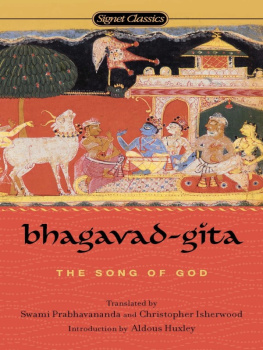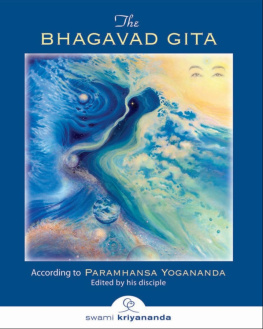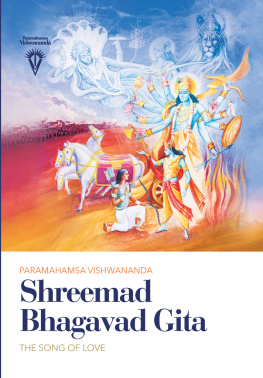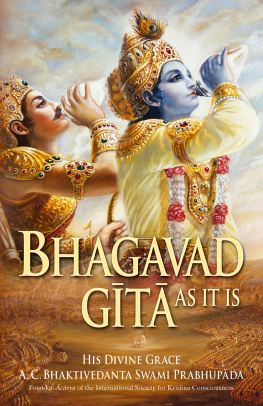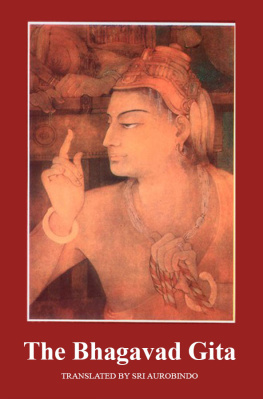Marballi - Essence of Karma Yoga: Selected Verses from the Bhagavad Gita
Here you can read online Marballi - Essence of Karma Yoga: Selected Verses from the Bhagavad Gita full text of the book (entire story) in english for free. Download pdf and epub, get meaning, cover and reviews about this ebook. year: 2014, publisher: Lulu.com, genre: Children. Description of the work, (preface) as well as reviews are available. Best literature library LitArk.com created for fans of good reading and offers a wide selection of genres:
Romance novel
Science fiction
Adventure
Detective
Science
History
Home and family
Prose
Art
Politics
Computer
Non-fiction
Religion
Business
Children
Humor
Choose a favorite category and find really read worthwhile books. Enjoy immersion in the world of imagination, feel the emotions of the characters or learn something new for yourself, make an fascinating discovery.
Essence of Karma Yoga: Selected Verses from the Bhagavad Gita: summary, description and annotation
We offer to read an annotation, description, summary or preface (depends on what the author of the book "Essence of Karma Yoga: Selected Verses from the Bhagavad Gita" wrote himself). If you haven't found the necessary information about the book — write in the comments, we will try to find it.
Marballi: author's other books
Who wrote Essence of Karma Yoga: Selected Verses from the Bhagavad Gita? Find out the surname, the name of the author of the book and a list of all author's works by series.
Essence of Karma Yoga: Selected Verses from the Bhagavad Gita — read online for free the complete book (whole text) full work
Below is the text of the book, divided by pages. System saving the place of the last page read, allows you to conveniently read the book "Essence of Karma Yoga: Selected Verses from the Bhagavad Gita" online for free, without having to search again every time where you left off. Put a bookmark, and you can go to the page where you finished reading at any time.
Font size:
Interval:
Bookmark:
GK Marballi
2014 by GK Marballi. All rights reserved.
ISBN 978-1-304-93077-4
No part of this book may be reproduced in any written, electronic, recording, or photocopying without written permission of the publisher or author. The exception would be in the case of brief quotations embodied in the critical articles or reviews and pages where permission is specifically granted by the publisher or author.
Although every precaution has been taken to verify the accuracy of the information contained herein, the author and publisher assume no responsibility for any errors or omissions. No liability is assumed for damages that may result from the use of information contained within.
Cover Design: James, GoOnWrite.com
Published By Azure Publishing, New York, USA
First Edition
yajnyaarthaarkarmanonyatra lokoyam karmabandhanaha |
tadartham karma kaunteya
muktasangah samaachara || . 9 ||
Other than by those actions performed for yajna , this world gets bound by action. Therefore, O Kaunteya , perform actions in that regard, without attachment.
So far, The Gita spoke about why performing action is essential, as well as what kind of action to perform. With this verse , it begins the main topic of this chapter, which deals with how to perform actions. The second chapter mentioned it briefly, but this chapter goes deeper into it.
The Gita uses the beautiful metaphor of a " yajna " to convey this teaching. In Indian culture, a yajna is a formal ritual of worship. Firstly, we fix a higher ideal before commencing a yajna , and dedicate the entire yajna to that ideal. Typically, that ideal is a " devataa " or a deity. Secondly, we perform actions such as chanting mantras and pouring oblations into the sacrificial fire, but do so with absolutely no trace of selfishness. Some mantras even include the words " naa mama" or "not me" to make unselfishness explicit.
So how does that ancient ritual apply to us? Let's look at a practical example. An accountant working for a corporation can be successful if she acts in the spirit of a yajna . She should set a higher ideal, e.g. "I dedicate myself to the success of this corporation".
Then, she should perform her job responsibilities in the service of that goal. She will, for instance, frequently sign large cheques where there are opportunities to play games for selfish profit. But she will not even think about such things because her focus is on the company's well - being, not hers.
Now let's see what happens when her goal becomes selfish. She will begin to do things that generate "conflict of interest" in corporate-speak. She may slowly divert some of the company money to a shell company owned by a friend and so on. From a wor l dly perspective, she will get kicked out of the company sooner or later. From a spiritual perspective, each selfish action will bind her, propelling her into further selfish desires, and away from self-realization.
Equanimity
sukhaduhkhe same kritvaa laabhaalaabhau jayaajayau |
tato yuddhaaya yujyasva naivam papamavapsyasi || 38 ||
Treat joy or sorrow, gain or loss, victory or defeat with equanimity, and then engage in war. By doing so, you will not incur sin .
This is one of the most important verse s in the second chapter, and perhaps in the entire Gita. In essence, The Gita instruct s us to maintain equanimity, an "even keel" attitude, not just in war, but in any circumstance in life.
On first glance, the lesson in this verse seems unapproachable and impossible to carry out, to some extent.
We encounter joy, sorrow, victory, defeat, gain and loss almost every day, even several times a day. And each time we encounter any of these situations, we get emotionally and sometimes ev en physically affected by them.
At work, a meeting with your boss does not go well. But on another day, your boss gives you an exemplary speech on a project well executed. How can we possible treat these as equal?
The Gita fully understands this point. Here, it only lays out the ultimate goal for us: the goal of equanimity, or treating each and every life situation eq ually without getting agitated.
So as we study karma yoga , if we think we have lost sight of the goal, let's remember this verse .
Focus On The Goal
karmanyevaadhikaaraste maa phaleshu kadaachana |
maa karmaphalaheturbhoormaa
te sangostvakarmani || 47 ||
You only have authority over action, not ever to the result. Don't be motivated by the result, and don't get attached to inaction.
T his verse is probably the most known and oft-quoted verse in the Gita. There are many chapters in the Gita that go deeper into the layers and layers of meaning packed into this verse . Given the richness of this verse , we shall try to understand it to the best extent possible. Since there are several messages in this verse , let's examine the teaching part by part.
Let's start with the first half of the verse . The message is as follows. The Gita says that we have authority only over the actions performed by us, but never on the result. In other words, we do not have complete control over the outcome of any activity. As we grow older and spend more time in this world, we know this fact instinctively. But because we forget it, we tend to get disappointed when things don't go our way, or get elated when things do.
Look at our own lives . W e can take any number of examples to test this theory. Take a simple thing as catching a bus that has just arrived on the other side of the road. We run to catch the bus. But even in such a simple task, the outcome is not guaranteed.
If we are able to catch the bus then all's well. But there are several other outcomes that could occur. The bus may leave before we get to the stop. We could catch the wrong bus. Once aboard, we may not have the fare. Worst of all, we could get hit by a car while crossing the road.
Or consider a complex task as a surgeon performing heart surgery. Take the world's best doctor trained at the world's best college, in the surgery room of the world's best hospital with the world's best surgery team. Even with all these things, that surgeon will never have a 100% success rate.
The outcome of any action is like an equation where we provide some of the variables, but not all of them. In fact, we may not even know all the variables that end up determining the outcome.
So unless we logically convince ourselves that we do not have complete control over the result of an action, we will not be able to learn the main teaching the second half of this verse . We will tackle that teaching in the next post.
Now let's move into the main teaching of this verse . Here The Gita urges us to not worry about the outcome, i.e. the result, of the action. How will this work?
W hen we perform our duty , we derive joy from the performance of action itself since we have the interest, desire and aptitude for it. Also, we do not have complete control over the outcome of our actions .
Therefore, we should never be motivated by the outcome when we know we have executed our actions with perfection, and that we do not have complete control on the outcome. Motivation for the outcome creates bondage - it is like a rope that ties us to the future , as it were . Instead, if we give up motivation for the outcome, there is no such binding created.
Let's address a few doubts that most of us may have when we hear this teaching. The first doubt could be : "If I am not motivated by the result, how will I know where I am heading? I want my project to be executed on time, I want my team to be inspired by a goal, I want progress in my career. How can I do all these things if I am not motivated by the result?"
Font size:
Interval:
Bookmark:
Similar books «Essence of Karma Yoga: Selected Verses from the Bhagavad Gita»
Look at similar books to Essence of Karma Yoga: Selected Verses from the Bhagavad Gita. We have selected literature similar in name and meaning in the hope of providing readers with more options to find new, interesting, not yet read works.
Discussion, reviews of the book Essence of Karma Yoga: Selected Verses from the Bhagavad Gita and just readers' own opinions. Leave your comments, write what you think about the work, its meaning or the main characters. Specify what exactly you liked and what you didn't like, and why you think so.





